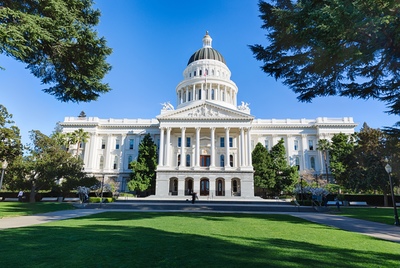
Compliance
How States Are Using AI for Compliance Enforcement in 2026
February 20, 2026 | Bradley Coffey
August 26, 2025 | Denisse Girón, Bradley Coffey, Hilary Smith

Key Takeaways:
Since the founding of the United States of America, lobbying has been seen as an important tool in the ability of corporations, associations, government entities, and individuals to exercise their constitutional right to petition the government. Edgar Lane, in his Lobbying and the Law, went so far as to declare that, “Lobbying in one form or another has been with us from the beginning. . . . It has, indeed, been so deeply woven into the American political fabric that one could, with considerable justice, assert that the history of lobbying comes close to being the history of American legislation.”
If the history of lobbying in the United States is indeed close to being the history of American legislation, then it is also important to recognize that the history of lobbying in the United States has not always been honorable; what the National Museum of American History calls “the dirty laundry of U.S. politics.” Due to the problematic history of lobbying, regulation has tended to follow the advice of Justice Louis Brandeis, who stated in 1913 that “sunlight is said to be the best of disinfectants; electric light the most efficient policeman.” Shine a light on bad behavior and the bad behavior will stop, or so the reasoning goes.
But can states go too far? Some state-level regulations may burden or limit a lobbyist’s political speech in a way that violates the core constitutional protections found in the First Amendment. Justice Kennedy, in his opinion for Citizens United v. Federal Election Commission (2010), wrote:
Speech is an essential mechanism of democracy, for it is the means to hold officials accountable to the people. The right of citizens to inquire, to hear, to speak, and to use information to reach consensus is a precondition to enlightened self-government and a necessary means to protect it. The First Amendment “‘has its fullest and most urgent application’ to speech uttered during a campaign for political office.”
Like many issues in American governance, the competing interests of the lobbyist and the regulator lead to a difficult policy conundrum: how to ensure lobbyists and their employers may exercise their First Amendment right while maintaining the appropriate level of disinfectant to maintain public trust in the policy process. In this article, we are particularly interested in how overly broad state regulation collides with the First Amendment rights of lobbyists and lobbyist employers.
The birthplace of American Independence’s regulation of lobbying would make a Puritan blush. From vague statutes to an overly aggressive Secretary of the Commonwealth, the Bay State is one of the least friendly states to those needing to petition the state government. While there are many issues with the way that Massachusetts regulates the activities of lobbying, the most intrusive is the requirement that an entity wishing to lobby in the commonwealth must register to do business with its Corporations Division.
This requirement is not explicitly found in the lobbying statute but is required by the Secretary of the Commonwealth in order to lobby officials in Massachusetts. The requirement leads to additional costs to the lobbyist’s client, who has to pay the registration and reporting fees and take on additional reporting obligations in addition to filing lobbying reports. It leaves little recourse for those unincorporated organizations that genuinely want to comply with the unwritten laws but do not have a means to do so. This requirement by Massachusetts has led lobbyist clients to abandon plans to lobby in the commonwealth when they file a registration with the lobbying division and it is rejected because they have not first registered with the corporations division.
The Silver State is another state that makes it difficult for lobbyists to effectively exercise their First Amendment rights. The difficulty here is less about regulation and more about the personalities tasked with enforcing that regulation.
During a recent training, a representative of the Legislative Counsel Bureau (LCB) told a group of lobbyists not to email his office because they’re not a “priority.” The LCB is the agency responsible for enforcing Nevada’s lobbying laws, and so this begs the question: if a lobbyist has a question about the lobbying law and a particular circumstance they find themselves in, who can they contact? Who wants to expose themselves to the kind of scrutiny a lobbyist often receives in a state that will not provide support to the regulated community?
Some states simply place extra burdens on lobbying through registration and reporting requirements. Arkansas, for example, requires a signed and notarized form to be submitted to the state before a registration is finalized. This must be a “wet” signature — electronic signatures and notarizations are not accepted by the Arkansas Ethics Commission. In a period of time and industry that is so fast-paced, adding in these archaic steps only slows down a lobbyist’s ability to comply. Similarly, in North Carolina, registered lobbyists and their clients must each file a notarized quarterly expense report, adding an extra step and cost to staying compliant.
Several states, including Georgia and Illinois, require frequent reporting (as often as twice per month), even if the lobbyist has no expenditures to report. In a local jurisdiction like San Jose, California, lobbyists must file weekly with the City Clerk for each calendar week they are registered as a lobbyist and have engaged in lobbying activity. Failure to file a report can lead to significant fines and other penalties.
Uniquely, the Commonwealth of Pennsylvania mandates that a lobbyist making a political contribution must register and report as a political action committee. Overly burdensome regulations can deter individuals and organizations from engaging in legitimate advocacy. What benefit or higher level of transparency do states that require outdated or extreme reporting steps claim to see, compared to states that do not have these requirements?
While transparency and accountability are fundamental to preserving public trust, excessive or outdated regulatory hurdles undermine, rather than strengthen, the democratic process. Requirements such as corporate registration, wet signatures, frequent filings, or the reclassification of individual lobbyists as political committees risk chilling constitutionally protected speech and discouraging legitimate advocacy. A modernized, balanced approach — one that safeguards both democratic integrity and accessibility — ensures that the right to petition the government remains meaningful, while still providing the public with confidence in the system.
Keeping up with rules, deadlines, and often confusing requirements is a daunting prospect for teams of all sizes. Let us manage your federal, state, and local registration and reporting responsibilities, or manage your Campaign Finance program. Read more about our Compliance Services here, or get in touch here.

February 20, 2026 | Bradley Coffey
-328a36-400px.jpg)
February 20, 2026 | Kelly Cox
-8748f6-400px.jpg)
February 19, 2026 | Izzy Aaron